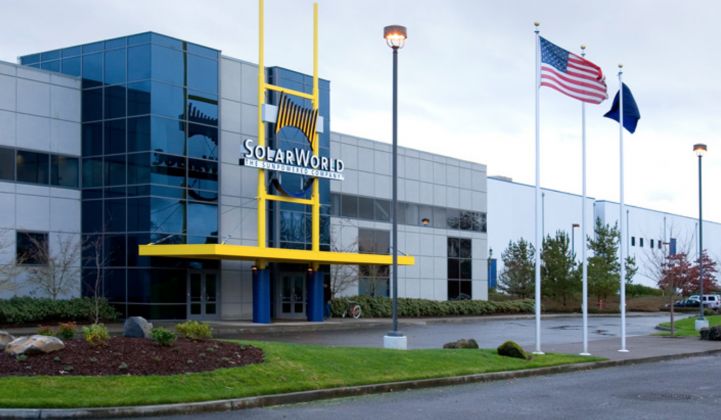Unconfirmed rumors swirled for weeks: SunPower was eyeing SolarWorld's U.S. manufacturing assets.
It made sense. SolarWorld has been looking for a buyer since last summer; SunPower desperately needed a bigger American manufacturing presence to avoid tariffs.
Turns out, the rumors were true.
On Wednesday morning, SunPower unveiled plans to acquire SolarWorld Americas for an undisclosed amount. If approved by U.S. and German regulators, the acquisition would add 430 megawatts of cell capacity and 550 megawatts of module capacity to SunPower's operations. The company would rival First Solar as the largest U.S. maker of solar modules.
"From a strategy perspective, you can see the logic," said MJ Shiao, head of Americas at GTM Research. "Without the Germany backing, SolarWorld USA needed a way to continue investing in R&D to stay competitive in the market. SunPower immediately injects manufacturing know-how and their P-series module — obviously with a target of keeping U.S. manufacturing competitive."
The proposed deal adds new context to SolarWorld's recent filing with government trade officials.
On Monday, SolarWorld Americas filed comments with U.S. trade representatives on the Trump administration's 30-percent solar tariffs. It supported exemptions for several solar companies that sell niche solar products and panels for off-grid lighting and signage. SolarWorld also supported SunPower's exclusion request — the only major manufacturer that the company backed.
“SunPower's copper-plated IBC products are structurally and functionally distinct from traditional CSPV front-contact cells and modules, and involve a substantially different production process,” according to the filing submitted by Timothy Brightbill at Wiley Rein, on behalf of SolarWorld Americas.
“This copper-plated IBC technology, combined with SunPower's substantial U.S. investment, provide strong justification for the exclusion of these products from the Section 201 remedies,” the filing stated. “SunPower has explained that excluding these products will allow it to increase its investment in R&D and module manufacturing in the United States-a key goal of the Section 201 remedies.”
Lo and behold, SunPower’s investment plans included SolarWorld.
Once trade remedies were approved, "everybody in the U.S. started to kick the tires and see what it would cost for that facility and what SolarWorld is looking for," a former SunPower employee, who asked to speak anonymously, told GTM before the acquisition was announced. "We definitely were deep in the analysis of a U.S. manufacturing facility."
In an analyst note this week, Roth Capital Partners explicitly called out the mention of SunPower: "We note SolarWorld strongly supports SunPower's 201 exclusion request. [The U.S. Trade Representative] will not necessarily follow SolarWorld's recommendation, but it definitely is a positive stance, in our view, for SunPower."
"I think this makes SolarWorld's letter of support in SunPower's pursuit of an 201 exemption super shady. There was obviously a huge conflict of interest when they wrote support for excluding SunPower's technology but not others," said GTM Research's Shiao.
Whatever happens with exemptions, the proposed deal will offer distinct advantages for SunPower, according to Shiao: "Because 201 tariffs are a percentage of customs value, the impact to SunPower is much higher than it is to standard crystalline modules. That means they're working against a higher tariff than the 8-10 cents per watt for typical solar modules. From that perspective, there's a little bit more space for them to work with when assessing the competitiveness of U.S. manufacturing versus just absorbing the tariff."
In other words, SunPower had a particularly strong incentive to pick up new domestic manufacturing assets.
In its announcement, SunPower said it plans to spend money on R&D and improving operations: "The company will invest in factory improvements and increased working capital, while retrofitting a portion of the facility to produce P-Series solar panels, in addition to continuing to produce and ship SolarWorld Americas' legacy products."
SolarWorld Americas has been looking for a buyer since last summer, when U.S. manufacturing and sales operations were put up for sale by an insolvency administrator.




